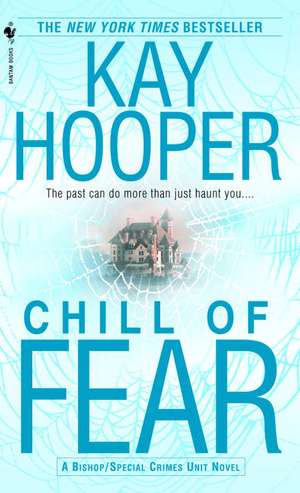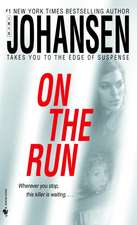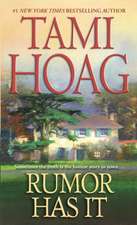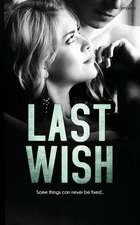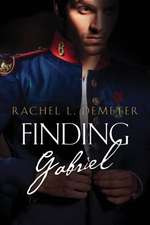Chill of Fear: Bishop/Special Crimes Unit
Autor Kay Hooperen Limba Engleză Paperback – 31 mai 2006
FBI agent Quentin Hayes always knew he had an unusual talent, even before he was recruited by Noah Bishop for the controversial Special Crimes Unit. But, as gifted as he is, for twenty years he’s been haunted by a heartbreaking unsolved murder that took place at The Lodge, a secluded Victorian-era resort in Tennessee. Now he’s returned one final time, determined to put the mystery to rest.
Diana Brisco has come there hoping to unlock the mystery of her troubled past. Instead, she is assailed by nightmares and the vision of a child who vanished from The Lodge years ago. And an FBI agent is trying to convince her that she isn’t crazy but that she has a rare gift, a gift that could catch a killer.
Quentin knows that this is his last chance to solve a case that has become a dangerous obsession. But can he persuade Diana to help him, knowing what it could cost her? For something cold and dark and pure evil is stalking the grounds of The Lodge. Something Diana may not survive. Something Quentin never felt before: the chill of fear.
From the Hardcover edition.
Preț: 47.66 lei
Nou
Puncte Express: 71
Preț estimativ în valută:
9.12€ • 9.49$ • 7.53£
9.12€ • 9.49$ • 7.53£
Carte disponibilă
Livrare economică 24 martie-07 aprilie
Preluare comenzi: 021 569.72.76
Specificații
ISBN-13: 9780553585995
ISBN-10: 0553585991
Pagini: 338
Dimensiuni: 107 x 173 x 30 mm
Greutate: 0.16 kg
Editura: Bantam Books
Seria Bishop/Special Crimes Unit
ISBN-10: 0553585991
Pagini: 338
Dimensiuni: 107 x 173 x 30 mm
Greutate: 0.16 kg
Editura: Bantam Books
Seria Bishop/Special Crimes Unit
Notă biografică
Kay Hooper, who has more than thirteen million copies of her books in print worldwide, has won numerous awards and high praise for her novels. She lives in North Carolina.
Extras
Chapter One
Present day
Nightmares again?"
Diana Brisco slipped her cold hands into the front pockets of her smock and frowned at him. "What makes you ask?"
"That." He nodded at the canvas on its easel in front of her, a canvas with a dark background and bright, harsh slashes of color in the foreground.
She joined him in staring at the canvas, and finally shrugged. "No, no nightmares." For once, at least. "Just in a mood, I guess."
"A dark mood."
"You told us to paint what we felt," she said defensively. "I did that."
He smiled, the expression lending his already angelic features such beauty that she unconsciously caught her breath.
"Yes, you did. And quite powerfully. I'm not worried about your work, Diana. It's superb, as usual. I'm concerned about you."
She mentally shook off the almost mesmerizing effect of his physical presence and ignored what she suspected was a pat-the-pupil-on-the-head compliment, saying, "I'm fine. I didn't sleep well, but not because of nightmares. Just because . . ." She shrugged again, unwilling to admit that she had been up half the night staring through her bedroom window, out over the dark valley. She had spent far too many nights that way since arriving in Leisure.
Looking for . . . something. God only knew what, because she certainly didn't.
Gently, but also matter-of-factly, he said, "Even if this workshop was designed for self-expression rather than therapy, I'd be offering the same advice, Diana. Once we're done here, get out of The Lodge for a while. Go for a walk, or a ride, or a swim. Sit out in one of the gardens with a book."
"In other words, stop thinking about myself so much."
"Stop thinking. For a while."
"Okay. Sure. Thanks." Diana knew she sounded brusque and wanted to apologize for it. He was only doing what he was supposed to do, after all, and probably had no idea that she'd heard it all before. But before she could form the words, he merely smiled and moved on to the next of his dozen or so "students" here in the bright, open space of the hotel's conservatory.
Diana kept her hands in the pockets of the paint-stained smock and frowned at her painting. Superb, huh? Yeah, right. To her eye, it looked more like the finger painting of a highly untalented six-year-old.
But, of course, quality was hardly the point. Talent was hardly the point.
Figuring out what was going on in her screwed-up mind was the point.
She took her gaze off the painting and watched as Beau Rafferty moved among his students. An artist of his caliber teaching this sort of workshop had struck her as extremely odd at first, but after a week of classes she had come to realize that he had a genuine gift not only for teaching, but also for reaching and helping troubled people.
Other people, at least. She could already see changes in most of the others participating in this workshop. Strained faces had begun to relax, smiles had appeared to replace frowns or haunted anxiety. She had even seen a few of them out enjoying some of the activities The Lodge had to offer.
But not Diana. Oh, no. Diana was still having nightmares when she could sleep at all, she couldn't remember the last time she had felt relaxed, and none of the myriad sports or recreational facilities here held the least appeal for her. And despite Rafferty's undoubted genius and ability to teach, she didn't believe that her rudimentary artistic skills had improved either.
In fact, this whole thing was probably just one more waste of her time and her father's money.
Diana looked back at her painting and hesitated for a moment before picking up her brush and adding one small streak of scarlet near the lower left corner. That finished it, she decided. She had no idea what it was or what it was supposed to represent to her, but it was finished.
She began cleaning her brushes automatically, trying to concentrate on the task and not think.
But, of course, that was part of her problem, the short attention span, these scattered, random thoughts and ideas flitting constantly through her mind, usually so fast they left her confused and disoriented at least half the time. Like bits and pieces of overheard conversations, the words and phrases came and went almost continually.
No focus, that's what the doctors said. They were sure she didn't have attention deficit disorder, despite having been medicated for that at least twice in her life; no, all the doctors and all the tests had determined that despite "somewhat elevated" levels of electrical activity, her problem wasn't physical or chemical, wasn't something in her brain--but something in her mind.
So far, none of them had been able to suggest a successful way of figuring out what that something was. And just about every conceivable means had been tried. The traditional couch and shrink. Hypnosis. Conscious regression, since no one had been able to hypnotize her to attempt the unconscious variety. Group therapy. Massage therapy. Various other kinds of therapy, both traditional and New Age. Including, now, painting, under the tutelage of an honest-to-God artistic genius, in yet another attempt to tap in to her inner Diana and ask what the hell was wrong with her.
One of her current doctors had suggested she try this, and Diana could only wonder if he was getting kickbacks for every referral.
Her father had spared no expense in trying to help his troubled only child, openly afraid that she might, as so many others had done, escape into alcohol or drugs or, worse, give up and commit suicide.
But Diana had never been tempted by the chemical forgetfulness that could be found in "recreational" drugs. In fact, she disliked losing control, a trait that only exacerbated her problem; the harder she tried to concentrate and focus, the more scattered her thoughts became. And the failure to control them, of course, depressed and disturbed her further, though never to the point of contemplating suicide.
Diana was no quitter. Which was why she was here, trying yet another form of therapy.
"I'll see you all back here tomorrow," Rafferty told his class, smiling, not offering a collective "Good work" because he had instead offered that individually.
Diana removed her smock and hung it on the hook at the side of the easel, and prepared to follow the others out of the conservatory.
"Diana?"
She waited, a little surprised, as Rafferty approached her.
"Take this." He held out a sketchpad and small box of watercolor pencils.
She accepted them, but with a frown. "Why? Is this some kind of exercise?"
"It's a suggestion. Keep the pad close by, and when you start to feel upset or anxious or restless, try drawing. Don't think about it, don't try to control what you draw, just draw."
"But--"
"Just let go and draw."
"This is like the inkblots, right? You're going to look at my sketches and interpret them, go all Freudian and figure out what's wrong with me?"
"I won't even see them, unless you want to show them to me. No, Diana, the sketches are just for you. They may help . . . clarify things for you."
She wondered, not for the first time, just how much he really knew about her and her demons, but didn't ask. Instead, she merely nodded. It was something she hadn't tried, so why not? "Okay, fine.
See you tomorrow."
"See you tomorrow, Diana."
She left the conservatory, going out into the gardens more because she didn't want to return to her cottage than because the gardens were an enjoyment for her. They were pretty, she supposed. Gorgeous, really, from the various themed gardens already in bloom in mid-April to the striking greenhouse that held an amazing variety of orchids.
But Diana walked through most of the charming scenery indifferently. She followed a flagstone path because it was there, crossing the arched footbridge over the man-enhanced stream holding numerous colorful koi and ending up in the supposedly serene Zen Garden, with its manicured shrubs and trees and carefully placed rocks and sand and statuary.
She sat down on a stone bench beside a weeping willow tree, telling herself she wouldn't remain long because the afternoon was waning and it got chilly this time of year as the sun dipped below the mountains. And then there was the fog, which had an unsettling tendency to creep across this valley and settle over The Lodge and its gardens so that finding one's way along the paths resembled a trip through a damp and chilly maze.
Diana definitely wasn't in the mood for that. But she nevertheless sat there longer than she had planned, finally opening the box of watercolor pencils and absently selecting one. They were already sharpened.
She opened the sketchpad and tried the pencil out just as absently, making yet another attempt to ignore the jumbled thoughts crowding her mind and concentrate on only one. Why she was having so much trouble sleeping here. It had been an issue now and then in her life, but not recently, not until she had come to The Lodge.
Nightmares had always been a problem for her, though still not regular occurrences, but since coming to The Lodge they had gotten worse. More intense, more . . . terrifying. She'd wake in the dark hours before dawn, gasping in panic yet unable to remember what it was that had so frightened her.
It was less traumatic to stay awake. Just curl up in the window seat in her bedroom, an afghan protecting her against the chill of the glass, and stare out at the valley and the dark mountains that loomed above.
Looking for . . . something. Nothing.
Waiting.
Diana came back to herself with a little start, suddenly aware of her aching fingers. She was holding one of the pencils, and most of the others lay beside her on the bench, out of their box, their once-sharpened ends dulled now. She had the sense that time had passed, and didn't want to look at her watch to see just how much.
That was all she needed--the return of something that hadn't happened to her in months. Blackouts.
Warily, she turned her gaze to the sketchpad on her knees. And saw, to her astonishment, the face she had drawn.
Slightly shaggy hair a color between gold and brown surrounded a lean face with high cheekbones and vivid blue eyes. There was a jut of determination to his jaw, and humor played around the faintly smiling mouth.
He seemed to be looking right back at Diana, those keen eyes curiously . . . knowing.
Artistically, it was better work than she knew herself capable of, which gave her the creeped-out feeling that someone else had drawn this. And lending weight to that was her certain knowledge that she had never seen this man before in her life.
"Jesus," she murmured. "Maybe I really am crazy, after all."
"I keep trying to tell you, Quentin, there's been nothing new." Nate McDaniel shook his head. "Matter of fact, since that time a few years back when you and--what was his name? Bishop?--helped find that missing girl out at The Lodge, we haven't had any unsolved disappearances or accidents anywhere in the area, let alone murders. It's been downright peaceful around here."
"Don't sound so disappointed," Quentin advised dryly. "Peaceful is a good thing." But his long fingers drummed restlessly on the edge of the desk, a gesture McDaniel took due note of. Not the most patient of men, was Quentin--which made it all the more interesting that he kept returning here in patient pursuit of answers.
McDaniel sighed. "Look, we both know that cold cases rarely get hot just because somebody sifts through all the paperwork one more time. And God knows you've sifted through it all enough times to be sure of that. The truth is, unless some new fact or bit of information comes to light, chances are that case stays cold. And after twenty-five years, what's likely to turn up now?"
"I don't know. But something has to."
Not without sympathy, McDaniel said, "Maybe it's time to let it go, Quentin."
"No. No, I'm not ready to do that."
"But you are ready to waste another vacation sitting in the conference room with dusty files and crime-scene photographs, and drinking lousy coffee for hours on end."
Quentin frowned. "As you say, that's hardly gotten me anywhere in years of trying."
"So try something else," McDaniel suggested. "I know you always stay here in town; why not get a room or cottage out at The Lodge this time?" He watched the play of emotions across the other man's expressive face, and added quietly, "I can guess why you've avoided that, but maybe it's time you hunted those ghosts where they're more likely to be."
"I hope you don't mean ghosts literally," Quentin muttered.
McDaniel hesitated, then said, "You'd know more about that than I would."
Quentin looked at him, brows raised.
"Oh, come on, Quentin. The SCU's been gaining quite a reputation in law enforcement circles, you know that. I'm not saying I buy everything I've heard, but it's clear you guys deal with stuff that's more than a little bit out of the ordinary. Hell, I always wondered how you and Bishop found that little girl, as if you went straight to her. I've followed a few hunches myself over the years, but they were never as accurate as yours clearly were that day."
"We got lucky."
"You had a damned sight more than luck on your side that day, and don't try to deny it."
"Maybe," Quentin admitted finally. "But whatever we had, whatever I have, it doesn't open a window into the past. And I'm no medium."
"That's somebody who talks to the dead, right?" McDaniel strove to keep the disbelief out of his voice but, judging by the other man's wry smile, failed.
"Yeah, a medium communicates with the dead. But, like I said, I'm not a medium."
Then what are you? But McDaniel stopped short of asking that question, uncomfortably aware of how it would sound. Instead, he said, "Maybe there aren't any ghosts at all out at The Lodge. I mean, there's been talk over the years that the place is haunted, but what old building doesn't have those sorts of stories around it? Anyway, what happened, happened out there."
"Twenty-five years ago. How many times has the place been remodeled or redecorated since then? How many people have come and gone? Christ, there aren't more than a handful of employees who were there, and I've talked to them all."
Responding to the last statement, McDaniel said thoughtfully, "Funny you should mention that. I'd forgotten, but as it turns out, there is a new employee there now who was also there twenty-five years ago. They just rehired him a few months back. Cullen Ruppe. He manages the stables, the same job he had back then."
From the Hardcover edition.
Present day
Nightmares again?"
Diana Brisco slipped her cold hands into the front pockets of her smock and frowned at him. "What makes you ask?"
"That." He nodded at the canvas on its easel in front of her, a canvas with a dark background and bright, harsh slashes of color in the foreground.
She joined him in staring at the canvas, and finally shrugged. "No, no nightmares." For once, at least. "Just in a mood, I guess."
"A dark mood."
"You told us to paint what we felt," she said defensively. "I did that."
He smiled, the expression lending his already angelic features such beauty that she unconsciously caught her breath.
"Yes, you did. And quite powerfully. I'm not worried about your work, Diana. It's superb, as usual. I'm concerned about you."
She mentally shook off the almost mesmerizing effect of his physical presence and ignored what she suspected was a pat-the-pupil-on-the-head compliment, saying, "I'm fine. I didn't sleep well, but not because of nightmares. Just because . . ." She shrugged again, unwilling to admit that she had been up half the night staring through her bedroom window, out over the dark valley. She had spent far too many nights that way since arriving in Leisure.
Looking for . . . something. God only knew what, because she certainly didn't.
Gently, but also matter-of-factly, he said, "Even if this workshop was designed for self-expression rather than therapy, I'd be offering the same advice, Diana. Once we're done here, get out of The Lodge for a while. Go for a walk, or a ride, or a swim. Sit out in one of the gardens with a book."
"In other words, stop thinking about myself so much."
"Stop thinking. For a while."
"Okay. Sure. Thanks." Diana knew she sounded brusque and wanted to apologize for it. He was only doing what he was supposed to do, after all, and probably had no idea that she'd heard it all before. But before she could form the words, he merely smiled and moved on to the next of his dozen or so "students" here in the bright, open space of the hotel's conservatory.
Diana kept her hands in the pockets of the paint-stained smock and frowned at her painting. Superb, huh? Yeah, right. To her eye, it looked more like the finger painting of a highly untalented six-year-old.
But, of course, quality was hardly the point. Talent was hardly the point.
Figuring out what was going on in her screwed-up mind was the point.
She took her gaze off the painting and watched as Beau Rafferty moved among his students. An artist of his caliber teaching this sort of workshop had struck her as extremely odd at first, but after a week of classes she had come to realize that he had a genuine gift not only for teaching, but also for reaching and helping troubled people.
Other people, at least. She could already see changes in most of the others participating in this workshop. Strained faces had begun to relax, smiles had appeared to replace frowns or haunted anxiety. She had even seen a few of them out enjoying some of the activities The Lodge had to offer.
But not Diana. Oh, no. Diana was still having nightmares when she could sleep at all, she couldn't remember the last time she had felt relaxed, and none of the myriad sports or recreational facilities here held the least appeal for her. And despite Rafferty's undoubted genius and ability to teach, she didn't believe that her rudimentary artistic skills had improved either.
In fact, this whole thing was probably just one more waste of her time and her father's money.
Diana looked back at her painting and hesitated for a moment before picking up her brush and adding one small streak of scarlet near the lower left corner. That finished it, she decided. She had no idea what it was or what it was supposed to represent to her, but it was finished.
She began cleaning her brushes automatically, trying to concentrate on the task and not think.
But, of course, that was part of her problem, the short attention span, these scattered, random thoughts and ideas flitting constantly through her mind, usually so fast they left her confused and disoriented at least half the time. Like bits and pieces of overheard conversations, the words and phrases came and went almost continually.
No focus, that's what the doctors said. They were sure she didn't have attention deficit disorder, despite having been medicated for that at least twice in her life; no, all the doctors and all the tests had determined that despite "somewhat elevated" levels of electrical activity, her problem wasn't physical or chemical, wasn't something in her brain--but something in her mind.
So far, none of them had been able to suggest a successful way of figuring out what that something was. And just about every conceivable means had been tried. The traditional couch and shrink. Hypnosis. Conscious regression, since no one had been able to hypnotize her to attempt the unconscious variety. Group therapy. Massage therapy. Various other kinds of therapy, both traditional and New Age. Including, now, painting, under the tutelage of an honest-to-God artistic genius, in yet another attempt to tap in to her inner Diana and ask what the hell was wrong with her.
One of her current doctors had suggested she try this, and Diana could only wonder if he was getting kickbacks for every referral.
Her father had spared no expense in trying to help his troubled only child, openly afraid that she might, as so many others had done, escape into alcohol or drugs or, worse, give up and commit suicide.
But Diana had never been tempted by the chemical forgetfulness that could be found in "recreational" drugs. In fact, she disliked losing control, a trait that only exacerbated her problem; the harder she tried to concentrate and focus, the more scattered her thoughts became. And the failure to control them, of course, depressed and disturbed her further, though never to the point of contemplating suicide.
Diana was no quitter. Which was why she was here, trying yet another form of therapy.
"I'll see you all back here tomorrow," Rafferty told his class, smiling, not offering a collective "Good work" because he had instead offered that individually.
Diana removed her smock and hung it on the hook at the side of the easel, and prepared to follow the others out of the conservatory.
"Diana?"
She waited, a little surprised, as Rafferty approached her.
"Take this." He held out a sketchpad and small box of watercolor pencils.
She accepted them, but with a frown. "Why? Is this some kind of exercise?"
"It's a suggestion. Keep the pad close by, and when you start to feel upset or anxious or restless, try drawing. Don't think about it, don't try to control what you draw, just draw."
"But--"
"Just let go and draw."
"This is like the inkblots, right? You're going to look at my sketches and interpret them, go all Freudian and figure out what's wrong with me?"
"I won't even see them, unless you want to show them to me. No, Diana, the sketches are just for you. They may help . . . clarify things for you."
She wondered, not for the first time, just how much he really knew about her and her demons, but didn't ask. Instead, she merely nodded. It was something she hadn't tried, so why not? "Okay, fine.
See you tomorrow."
"See you tomorrow, Diana."
She left the conservatory, going out into the gardens more because she didn't want to return to her cottage than because the gardens were an enjoyment for her. They were pretty, she supposed. Gorgeous, really, from the various themed gardens already in bloom in mid-April to the striking greenhouse that held an amazing variety of orchids.
But Diana walked through most of the charming scenery indifferently. She followed a flagstone path because it was there, crossing the arched footbridge over the man-enhanced stream holding numerous colorful koi and ending up in the supposedly serene Zen Garden, with its manicured shrubs and trees and carefully placed rocks and sand and statuary.
She sat down on a stone bench beside a weeping willow tree, telling herself she wouldn't remain long because the afternoon was waning and it got chilly this time of year as the sun dipped below the mountains. And then there was the fog, which had an unsettling tendency to creep across this valley and settle over The Lodge and its gardens so that finding one's way along the paths resembled a trip through a damp and chilly maze.
Diana definitely wasn't in the mood for that. But she nevertheless sat there longer than she had planned, finally opening the box of watercolor pencils and absently selecting one. They were already sharpened.
She opened the sketchpad and tried the pencil out just as absently, making yet another attempt to ignore the jumbled thoughts crowding her mind and concentrate on only one. Why she was having so much trouble sleeping here. It had been an issue now and then in her life, but not recently, not until she had come to The Lodge.
Nightmares had always been a problem for her, though still not regular occurrences, but since coming to The Lodge they had gotten worse. More intense, more . . . terrifying. She'd wake in the dark hours before dawn, gasping in panic yet unable to remember what it was that had so frightened her.
It was less traumatic to stay awake. Just curl up in the window seat in her bedroom, an afghan protecting her against the chill of the glass, and stare out at the valley and the dark mountains that loomed above.
Looking for . . . something. Nothing.
Waiting.
Diana came back to herself with a little start, suddenly aware of her aching fingers. She was holding one of the pencils, and most of the others lay beside her on the bench, out of their box, their once-sharpened ends dulled now. She had the sense that time had passed, and didn't want to look at her watch to see just how much.
That was all she needed--the return of something that hadn't happened to her in months. Blackouts.
Warily, she turned her gaze to the sketchpad on her knees. And saw, to her astonishment, the face she had drawn.
Slightly shaggy hair a color between gold and brown surrounded a lean face with high cheekbones and vivid blue eyes. There was a jut of determination to his jaw, and humor played around the faintly smiling mouth.
He seemed to be looking right back at Diana, those keen eyes curiously . . . knowing.
Artistically, it was better work than she knew herself capable of, which gave her the creeped-out feeling that someone else had drawn this. And lending weight to that was her certain knowledge that she had never seen this man before in her life.
"Jesus," she murmured. "Maybe I really am crazy, after all."
"I keep trying to tell you, Quentin, there's been nothing new." Nate McDaniel shook his head. "Matter of fact, since that time a few years back when you and--what was his name? Bishop?--helped find that missing girl out at The Lodge, we haven't had any unsolved disappearances or accidents anywhere in the area, let alone murders. It's been downright peaceful around here."
"Don't sound so disappointed," Quentin advised dryly. "Peaceful is a good thing." But his long fingers drummed restlessly on the edge of the desk, a gesture McDaniel took due note of. Not the most patient of men, was Quentin--which made it all the more interesting that he kept returning here in patient pursuit of answers.
McDaniel sighed. "Look, we both know that cold cases rarely get hot just because somebody sifts through all the paperwork one more time. And God knows you've sifted through it all enough times to be sure of that. The truth is, unless some new fact or bit of information comes to light, chances are that case stays cold. And after twenty-five years, what's likely to turn up now?"
"I don't know. But something has to."
Not without sympathy, McDaniel said, "Maybe it's time to let it go, Quentin."
"No. No, I'm not ready to do that."
"But you are ready to waste another vacation sitting in the conference room with dusty files and crime-scene photographs, and drinking lousy coffee for hours on end."
Quentin frowned. "As you say, that's hardly gotten me anywhere in years of trying."
"So try something else," McDaniel suggested. "I know you always stay here in town; why not get a room or cottage out at The Lodge this time?" He watched the play of emotions across the other man's expressive face, and added quietly, "I can guess why you've avoided that, but maybe it's time you hunted those ghosts where they're more likely to be."
"I hope you don't mean ghosts literally," Quentin muttered.
McDaniel hesitated, then said, "You'd know more about that than I would."
Quentin looked at him, brows raised.
"Oh, come on, Quentin. The SCU's been gaining quite a reputation in law enforcement circles, you know that. I'm not saying I buy everything I've heard, but it's clear you guys deal with stuff that's more than a little bit out of the ordinary. Hell, I always wondered how you and Bishop found that little girl, as if you went straight to her. I've followed a few hunches myself over the years, but they were never as accurate as yours clearly were that day."
"We got lucky."
"You had a damned sight more than luck on your side that day, and don't try to deny it."
"Maybe," Quentin admitted finally. "But whatever we had, whatever I have, it doesn't open a window into the past. And I'm no medium."
"That's somebody who talks to the dead, right?" McDaniel strove to keep the disbelief out of his voice but, judging by the other man's wry smile, failed.
"Yeah, a medium communicates with the dead. But, like I said, I'm not a medium."
Then what are you? But McDaniel stopped short of asking that question, uncomfortably aware of how it would sound. Instead, he said, "Maybe there aren't any ghosts at all out at The Lodge. I mean, there's been talk over the years that the place is haunted, but what old building doesn't have those sorts of stories around it? Anyway, what happened, happened out there."
"Twenty-five years ago. How many times has the place been remodeled or redecorated since then? How many people have come and gone? Christ, there aren't more than a handful of employees who were there, and I've talked to them all."
Responding to the last statement, McDaniel said thoughtfully, "Funny you should mention that. I'd forgotten, but as it turns out, there is a new employee there now who was also there twenty-five years ago. They just rehired him a few months back. Cullen Ruppe. He manages the stables, the same job he had back then."
From the Hardcover edition.
Descriere
In the bestselling second installment of Hooper's Fear trilogy, FBI agent Quentin Hayes has been haunted by an unsolved murder that took place at a secluded Victorian-era resort in Tennessee. Now he returns to the resort one final time to put the mystery to rest.
